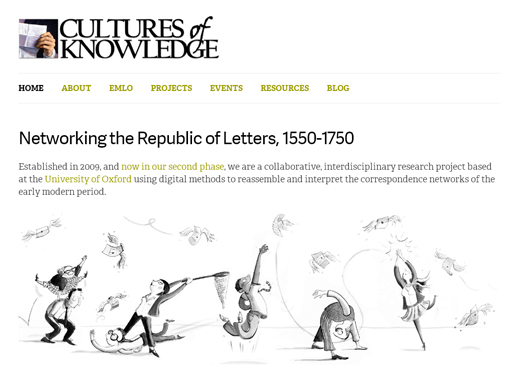 You’ve found our old website, which represents an archive of our activities during the first phase of Cultures of Knowledge, which ran between 2009 and 2012. To find out what we’re up to between now and the end of 2014, and to stay up to date with all things CofK, please visit our shiny new site. See you on the other side!
You’ve found our old website, which represents an archive of our activities during the first phase of Cultures of Knowledge, which ran between 2009 and 2012. To find out what we’re up to between now and the end of 2014, and to stay up to date with all things CofK, please visit our shiny new site. See you on the other side!
You are viewing the Cultures of Knowledge Blog archive for the ‘Websites and Databases’ Category:
Cultures of Knowledge Has Moved!
Journal Special Issue: New Directions in Early Modern Correspondence
Tags: Archives, Centre for Editing Lives and Letters, Diplomatic History, England, Materiality, Networks, Seventeenth Century, Sixteenth Century, Union Catalogue
 Those seeking to balance the port and mince pies this holiday season with some state-of-the-art reflections on early modern epistolarity are in luck: the latest issue of Lives & Letters – the free online journal of UCL’s Centre for Editing Lives and Letters – is devoted to New Directions in the Study of Early Modern Correspondence.
Those seeking to balance the port and mince pies this holiday season with some state-of-the-art reflections on early modern epistolarity are in luck: the latest issue of Lives & Letters – the free online journal of UCL’s Centre for Editing Lives and Letters – is devoted to New Directions in the Study of Early Modern Correspondence.
Guest-edited by James Daybell and Andrew Gordon, and developing out of a conference held at Plymouth University in 2011, the issue features an introduction to the latest developments in the field (in which EMLO gets a name-check); eight case studies of particular correspondents and correspondence networks; and a spectacularly useful select bibliography on the manuscript letter in early modern England. All articles are free for download from the journal website. James also contributed to our 2011 seminar series (here’s the podcast), while his latest book on the material letter has just been reviewed by the IHR.
Presenting EMLO at Digital Transformations Moot
Tags: AHRC, Databases, Digitization, Union Catalogue, Visualization
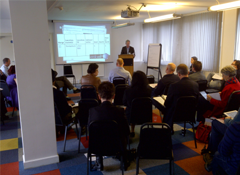
Howard mid-‘yack’
An outing to London last Monday when we presented Early Modern Letters Online at the Digital Transformations Moot, curated and funded by the AHRC. The day long event brought together digital humanists with thinkers and practitioners from other disciplines and sectors ‘to explore the possibilities of the Digital Transformations theme for new and exciting ways of working: to hack, to make, to break’.
The Moot did a great job of showcasing the very wide range of work (and attendant debates) currently being done at the intersection of the humanities and the technical, and in particular in highlighting and fostering new kinds of connections between digital technologies, arts and the humanities, and the creative and cultural industries (the latter being much more strongly represented than is usual at DH gatherings). It was also really interesting from the perspective of event design. Decked out in bracing, challenging terminology – debates were ‘moots’; delegates were ‘mootlings’; papers became ‘yacks’ – the day spread keynote lectures, panel discussions, software demos, and PechaKucha-style talks across multiple tracks and spaces in a kind of freeform digital smörgåsbord that rewarded curiosity and encouraged the creation of individual narratives and serendipitous connections between the sampled components. Further details on the Moot webpage, while the Twitter hashtag was #digitrans; videos of the various live streams will be posted the the webpage shortly.
Letters in Focus: Things That Go Bump in the Night
Tags: Archives, Bodleian Resources, England, Ghosts, History of Scholarship, Letters in Focus, Libraries, News, Religion, Seventeenth Century, Union Catalogue, Witchcraft
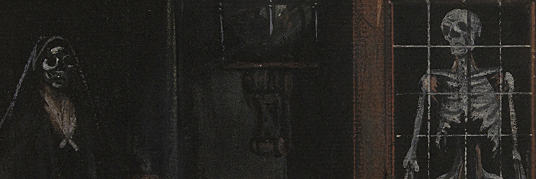
So, the evenings draw in, All Hallows’ Eve is upon us, and I find myself creeping through autumnal mists to the Bodleian’s Special Collections in search of ghosts.
There are many fleeting glimpses of hauntings in EMLO. In 1675, William Fulman asked Anthony Wood to confirm ‘the story of a ghostly funeral procession at night to St Peter le Bailey which terrified some of the Masters who were walking with the Proctor, but two which followed the procession to the Church door found the doors to open of their own accord, and then all to vanish and are since dead’. In 1706, Anne Griggs reported ‘the ghostly interview at Souldern Vicarage between the Vicar Mr Shaw and the apparition of his friend Mr Naylor on July 28… The apparition foretells the death of Mr Shaw…’ (sadly, Mr Naylor was a well-informed ghost; the Clergy of the Church of England Database [Person ID: 20286] reveals that one Geoffrey Shaw, rector of Soulderne, Oxfordshire, died on 17 November 1706, less than four months after this ghoulish encounter).
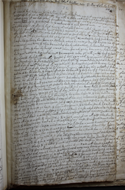 |
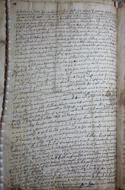 |
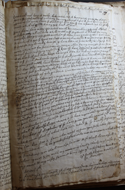 |
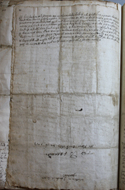 |
Bodleian Library, MS Ballard 1, fols 72–73: A seventeenth-century poltergeist. Images reproduced courtesy of the Bodleian Libraries.
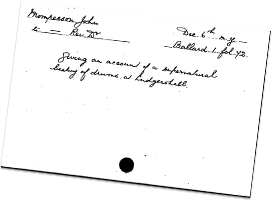 One record above all others tempts me out into the damp October fog: on a handwritten index card from the Bodleian card catalogue that gives no year, and describes a John Mompesson writing to a Reverend Doctor (now known to be William Creed, Oxford’s Regius Professor of Divinity) on 6 December (now known to be 1662), are the words ‘supernatural beating of drums’. Calling up the letter, I encounter a spine-chilling tale of a seventeenth-century household terrorized by a poltergeist. Mompesson describes how, following his apprehension of a fraudulent drummer in Ludgershall (Wiltshire) and the confiscation of the latter’s instrument, his family home in nearby Tedworth (now Tidworth) was assailed by nocturnal thumps and noises so extreme that ‘the windows would shake and the beds’. His children were special targets; apart from a brief interlude of three weeks after his wife gave birth, their beds were beaten, and the family had to endure the tune ‘Roundheads and Cuckolds goe digge, goe digge’ (more on this popular early modern ditty here). Whatever ‘it’ was ran ‘under the bed-teeke’ and scratched as if it had ‘iron talons’, tossing the young ones in bed; it left sulphurous smells, it hurled shoes over the heads of adults, pulled the infants by their nightgowns and hair, and even threw a bedstaff at the rector of Tedworth, John Cragge (CCED Person ID: 21834, yet another cleric who died relatively soon after his brush with the supernatural). See the letter images above for the whole terrifying story.
One record above all others tempts me out into the damp October fog: on a handwritten index card from the Bodleian card catalogue that gives no year, and describes a John Mompesson writing to a Reverend Doctor (now known to be William Creed, Oxford’s Regius Professor of Divinity) on 6 December (now known to be 1662), are the words ‘supernatural beating of drums’. Calling up the letter, I encounter a spine-chilling tale of a seventeenth-century household terrorized by a poltergeist. Mompesson describes how, following his apprehension of a fraudulent drummer in Ludgershall (Wiltshire) and the confiscation of the latter’s instrument, his family home in nearby Tedworth (now Tidworth) was assailed by nocturnal thumps and noises so extreme that ‘the windows would shake and the beds’. His children were special targets; apart from a brief interlude of three weeks after his wife gave birth, their beds were beaten, and the family had to endure the tune ‘Roundheads and Cuckolds goe digge, goe digge’ (more on this popular early modern ditty here). Whatever ‘it’ was ran ‘under the bed-teeke’ and scratched as if it had ‘iron talons’, tossing the young ones in bed; it left sulphurous smells, it hurled shoes over the heads of adults, pulled the infants by their nightgowns and hair, and even threw a bedstaff at the rector of Tedworth, John Cragge (CCED Person ID: 21834, yet another cleric who died relatively soon after his brush with the supernatural). See the letter images above for the whole terrifying story.
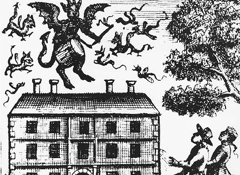
A demonic representation of the Tedworth drummer from Glanvill’s 1681 treatise
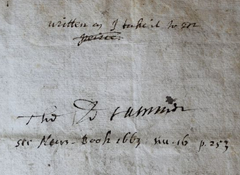
Endorsements on the letter, including a cross-reference to a 1663 news book
The Drummer of Tedworth, it turns out, is a celebrated case within the historiography of witchcraft and the early modern occult; it was given a central place in Joseph Glanvill’s 1681 attack on scepticism, the Saducismus Triumphatus, its notoriety continued to grow in the eighteenth and nineteenth centuries, and it has even been subject to minor Disneyfication. The incident, its manuscript witnesses, and its complex appropriation and memorialisation by and within different intellectual traditions is analysed in detail in a 2005 article (pdf) by Michael Hunter, which includes a full transcription of this same 6 December letter collated from three known extant versions: a copy in Corpus Christi, Oxford; a now untraceable copy formerly in a private collection in Dorset; and a copy in the hand of Anthony Wood. The document thrown up by our cryptic Bodleian card record is almost certainly not Mompesson’s original letter – there is no seal, and the lines extending to the page edges on both sides of the folio are indicative of copying – but rather adds a fourth scribal copy into the mix, one that, judging by the endorsements in two separate hands, enjoyed a complex afterlife before becoming part of the Ballard collection, most likely via the papers of Arthur Charlett (on the scribal publication and circulation of newsworthy missives in early modern England see chapter seven of James Daybell’s recent monograph on the material letter and his podcast in our 2011 seminar series). Even if this account is second-hand, close the curtains, pull up a chair, and get reading; there’s nothing like a percussive poltergeist to add drama and intrigue to Halloween…
Letters in Focus with Miranda Lewis
Miranda is editing metadata from the Bodleian card catalogue of correspondence for our union catalogue, Early Modern Letters Online. On a regular basis, she brings us hand-picked and contextualised records.
Letters in Focus: University Challenged
Tags: Bodleian Resources, History of Scholarship, Latrines, Letters in Focus, Students, Union Catalogue, Universities
Following in the footsteps of a host of EMLO correspondents, students and lecturers the world over are currently acclimatizing themselves to a new academic year. With a plethora of challenges and possibilities beckoning, the beginning of university term is always exciting.
For many, it’s a period of upheaval, of relocation from one place to another, and of settling in, usually without home comforts, as Johann Freinshem reveals in a letter of 1642 to G. J. Vossius when he asks, for fear his baggage be detained, whether he might extract ‘books and furniture for his private use, which he understands other students have done’. Even the journey to the seat of learning itself is not without risk and a Danish student, Johann Wandalin, recounts to William Sancroft his misfortune as all his possessions were lost at sea en route to England.
This is a time when academics worry about funding, fees, and maintenance costs, and, like Polyander, might even fret over money promised for Hungarian students which has not arrived. Whilst some seek extra work to make ends meet, just as the Reverend William Stonestreet tells of a young student desperate for employment to help ‘eke out his subsistence’, others might go up in the world and take possession of bigger and more comfortable digs; we read of Francis Heardson, who in 1668 became a fellow of Emmanuel College, Cambridge, transferring from a student chamber to something significantly more commodious, describing ‘its advantages and the furniture which is in it’. Year after year at this particular moment, lecturers face a mountain of preparatory work and it’s no surprise to find Henry Dodwell advising on a forthcoming course in ecclesiastical history.
There are rocks to be navigated and opportunities which should not be squandered. Jacques Philippe D’Orville laments how certain students succumb to poor work habits and stresses ‘the importance of attentive listening to Professors’ lectures; and attacks students’ prevalent vice of inattention in its various manifestations; as galling to the teachers and coming home to roost with students in wasted opportunities and backwardness.’ Everyone is aware of the brickbats the terms ahead might hurl, yet not everyone is faced with an incident as dramatic as the ‘student Mr. Bonython being seized with madness’ who set fire to his chambers, nor the fate that befell Francis Bayly, a poor unfortunate Christ Church student who, according to John Keill, on the day that George Smalridge was installed as Dean of Christ Church ‘fell into the house of office & was suffocated’ (there was apparently a strong tradition of untimely ends in the latrines of early modern Oxford; see Philip’s recent blog post Death in the Privy for another sad example).
Such is the beginning of term. With so much to remember, so much to explore, so much to learn, good luck to all concerned. We hope you find EMLO useful in your studies; and look out for those treacherous toilets…
Letters in Focus with Miranda Lewis
Miranda is editing metadata from the Bodleian card catalogue of correspondence for our union catalogue, Early Modern Letters Online. On a regular basis, she brings us hand-picked and contextualised records.
The Seventeenth Century and Routledge
Tags: Digitization, Routledge, Seventeenth Century, The Seventeenth Century Journal
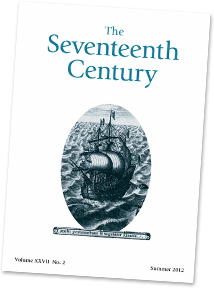 From 2013, The Seventeenth Century journal will be published by Routledge. This exciting new partnership was celebrated at the first of two publisher-sponsored drinks receptions at our latest conference Communities of Knowledge: Epistolary Cultures in the Early Modern World (20-22 September, 2012).
From 2013, The Seventeenth Century journal will be published by Routledge. This exciting new partnership was celebrated at the first of two publisher-sponsored drinks receptions at our latest conference Communities of Knowledge: Epistolary Cultures in the Early Modern World (20-22 September, 2012).
A leading journal in early modern studies, focusing in particular on close textual analyses of fresh sources and innovative interdisciplinary approaches, The Seventeenth Century is published four times per year. During the reception, over eighty delegates and guests assembled in the modern and airy senior common room and terrace of the Faculty of English to toast this new relationship over sparkling wine and delicious canapés provided by the Organic Deli Café. We were also treated to short speeches from Professor Richard Maber, General Editor of the journal and speaker at the conference, and Adam Burbage, Managing Editor at Routledge. In moves close to the Project’s heart, both described plans to increase the journal’s online presence, including the digitization of all back issues, full-colour publication online, a new digital submission and refereeing system for prospective authors, and a new journal website on Routledge’s cutting-edge platform.

Adam Burbage from Routledge samples some canapés
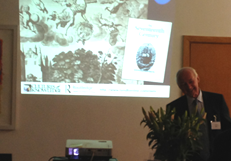
General Editor Richard Maber describes the new partnership
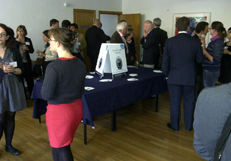
Guests circulate around the Routledge display table
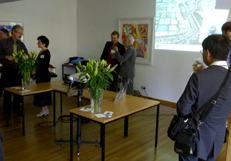
Lilies, celebratory slides, sparkling wine, sparkling conversation

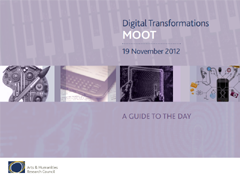


 Join
Join 